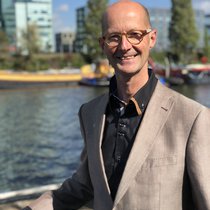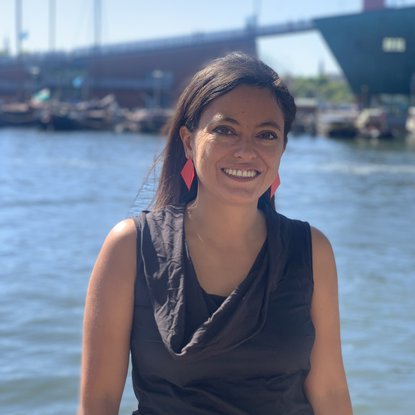In Amsterdam-north, Buiksloterham to be more specific, current and future residents will become part of a local energy market where they can trade sustainably generated energy - by equipping buildings with smart mobility and energy technologies - via a local digital platform.
Here, the (surplus of) energy will be created and balanced in Buiksloterham's local energy system. Subsequently, the energy generated can be stored locally and shared with the neighbors. This way, the residents of this district will not only be energy consumers, but also energy producers.
Buiksloterham will also, among others, be given a collection point for electric partial transport. As a result, the district will become carbon neutral and produce more energy than they use on an unprecedented scale. In other words, Buiksloterham will become a "Positive Energy District" (PED).
ATELIER: Reducing 1,7kton of CO2 emissions
The aforementioned developments are part of the ATELIER project, which is part of the European Commission's research and innovation programme Horizon2020. Coordinated by the City of Amsterdam, ATELIER will focus on developing citizen-driven Positive Energy Districts in two "Lighthouse Cities", Amsterdam and Bilbao, combining the expertise and commitment of 30 partners from 11 countries.
In Amsterdam and Bilbao, innovative energy solutions will be implemented in two neighborhoods: Buiksloterham and Zorrotzaurre. Here, ATELIER will showcase innovative solutions that integrate buildings with smart mobility and technologies to create sustainable energy rather than consume this energy.
As a result of creating these PEDs in Amsterdam and Bilbao, the goal is to reach an energy surplus of 1340 MWh of primary energy and save 1,7 kton of CO2 emissions and 23 t of NOx-emissions in total.
Furthermore, with the ATELIER project it is aimed to create and replicate the successfully implemented solutions in these Positive Energy Districts within 6 other European cities. Bratislava, Budapest, Copenhagen, Krakow, Matosinhos and Riga are "fellow cities" in this project. These cities will use the innovations and techniques developed in Amsterdam and Bilbao to prepare such a neighborhood in their own city.
“We are excited to build these 'Positive Energy Districts' in eight European cities together with 29 European parties, among others municipalities, knowledge institutes and companies.”
Leendert Verhoef
Former Urban Living Lab Program Developer at AMS Institute

Our role: applying the Living Lab methodology
In order to realize the ‘Positive Energy Districts’, the cities involved will establish ‘Innovation Ateliers’ with 29 European parties, o.a. local authorities, industries, knowledge institutes, citizens and local initiatives. In these Innovation Ateliers, these stakeholders will co-create to remove any obstacles (legal, financial, social, etc.) in the implementation process of the energy solutions and fit them to citizens’ objectives and behavior.
In this process, our role is to provide our Living Lab expertise to these Ateliers. In short, Urban Living Labs provide a co-innovative setting, in which multiple stakeholders jointly test, develop and create metropolitan solutions. To illustrate, for the project, we'll monitor the Innovation Ateliers in Bilbao and Amsterdam with the aim of distilling an “Innovation Atelier plan of approach”.
More specifically, we'll do this a) by monitoring the development process of the Innovation Ateliers over the duration of five years based on our Living Lab process and publication by Ellen van Bueren and b) by monitoring what impact the Innovation Ateliers have on the projects (in terms of ‘measures’) in both Amsterdam and Bilboa. The latter is done in order to determine what the impact of having an Innovation Atelier in place is on the realization of a Positive Energy District.
Ultimately, based on these lessons learned, in the second half of the ATELIER project, the 6 fellow cities will each create their own Innovation workshops.
“In this project, we're learning about different innovation cultures throughout Europe. Hence, ATELIER provides us with a great opportunity to further develop our Living Lab methodology in an international context.”
Aranka Dijkstra
Former Program Developer Living Labs at AMS Institute

A Roadmap for 2050
This project will cover 5 years of planning, developing and monitoring. The first step is starting up this project and implementing first sustainable energy systems. Among others, to pave the way for energy positive cities in Europe, the eight participating cities will all develop a roadmap ‘City Vision 2050’ for upscaling the developed solutions.
Eventually, the knowledge gained in this particular district will also be applied to other places in the city of Amsterdam - for all Amsterdammers to benefit from these innovations. Also, the Innovation Ateliers will support this replication to other EU-cities.
After the ATELIER project has ended, its Innovation Ateliers will continue, forming continuous engines for upscaling the innovations within the participating cities.
“The Innovation Ateliers will be self-sustaining, continuing for a long time after the project has ended, thus being engines for the upscaling and replication of solutions within the ATELIER cities and beyond.”
Frank Tazelaar | Head of Sustainability | City of Amsterdam

Further reading
We aim to keep this page updated with the most recent developments. You're also invited to follow us on Twitter: @AtelierH2020 or take a look at the project website: ATELIER.
Research output
Research output is continuously being uploaded on the website openresearch.amsterdam. View the ATELIER page here.
| Duration: |
|
Project members

Leendert Verhoef
AMS Institute
Juanita Devis Clavijo
AMS InstitutePartners




























